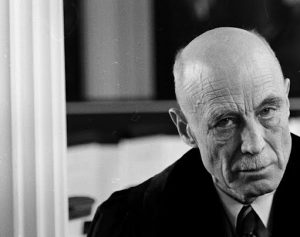The BEST: “The Idea of Covenant in American Democracy”

 Summary: In 1953, Yale theologian H. Richard Niebuhr was asked, “To what extent did religious and specifically Christian convictions influence the development of American democracy; and, to what extent can that democracy be maintained here, or be reproduced elsewhere, without the aid of such convictions?” In response, Niebuhr proffered the theory of America as a covenantal community. In contrast with a contractual society, which is based on transactions of mutual convenience, the covenantal model is built on trust and the unspoken voluntary promise on the part of each member of the covenant that every decision one makes will be in the interests of enhancing the greater good.
Summary: In 1953, Yale theologian H. Richard Niebuhr was asked, “To what extent did religious and specifically Christian convictions influence the development of American democracy; and, to what extent can that democracy be maintained here, or be reproduced elsewhere, without the aid of such convictions?” In response, Niebuhr proffered the theory of America as a covenantal community. In contrast with a contractual society, which is based on transactions of mutual convenience, the covenantal model is built on trust and the unspoken voluntary promise on the part of each member of the covenant that every decision one makes will be in the interests of enhancing the greater good.

Listen to the author discuss this column on the TRADITION Podcast
Why this is The BEST: In 2007, whilst on the presidential campaign trail, Barack Obama told David Brooks that his favorite theologian was Reinhold Niebuhr, Richard’s more famous older brother. Reinhold’s doctrine of Christian Realism greatly impacted 20th century Ame
rican foreign policy ideology. While R. Jonathan Sacks does make fleeting reference to Reinhold, he was clearly more influenced by the teachings of Richard Niebuhr. Apart from his essay “The Idea of Covenant in American Democracy,” which R. Sacks quotes extensively in The Home We Build Together, R. Sacks appears to have based his initial framework in To Heal a Fractured World: The Ethics of Responsibility on Richard Niebuhr’s The Responsible Self. (Unfortunately, the index editors confuse the two brothers, misattributing Sacks’ source to Reinhold.)
While Christianity’s sources on how to lead a responsible, moral life are less apparent (see Niebuhr’s The Responsible Self), Sacks is able to rework Niebuhr’s ideas through the lens of Judaism, utilizing its abundance of scriptural and midrashic material. Popularized later in Covenant & Conversation, R. Sacks was always an outstanding darshan and would, very convincingly, anchor his ground-breaking ideas in a deft reinterpretation of classical sources.
Acquaintance with the ideology of Richard Niebuhr is essential for an understanding of contemporary anti-Israel advocacy in the mainline Churches. Judaism’s distinction between particularistic and universalistic relationships allowed R. Sacks to reconfigure Niebuhr’s thoughts on responsibility, distinguishing between national and global societal duties of care. The universalism of Christianity, however, makes no such distinction. Consequently, Niebuhr’s doctrine of “Radical Monotheism” dictates that allegiance to country over individual is idolatrous. Every response in life (the root word of responsibility) must satisfy faithfulness to God above all other considerations – and God always cares for the oppressed.
As a result of this complexity, Niebuhr concludes his “Idea of Covenant” essay uncertain as to whether the principles undergirding the American democratic model could be expanded universally. R. Sacks believes that the model could be reproduced and argues for such a society in Britain. One of the impediments that Sacks does not address is that in the American model, “Government must be of the people by the people for the people but always under God.” Niebuhr attributes America’s covenantal model to the effect of “continual domestic study of the Bible upon the national character and imagination of the American people.” While R. Sacks proposes a covenantal framework for British society, noticeably absent are Niebuhr’s prerequisites of Bible-study and pervasive loyalty to God.
Nevertheless, Sacks’ acknowledges that the covenant proposition has applications beyond national society and may be more implementable on a micro-level. Quoting Putnam’s Bowling Alone, which laments the decline of civic groups, R. Sacks calls for a reinvigoration of such indispensable societal structures, as they occupy an important space between the two modalities of the state and the individual. In fact, the “idea of covenant” may have been R. Sacks’ parting message to the world. He concludes his final philosophical work, Morality:
My firm belief is that the concept of covenant has the power to transform the world… we can change. Societies have moved from “I” to “We” in the past. They did so in the nineteenth century. They did so in the twentieth century. They can do so in the future. And it begins with us.
Daniel Friedman, senior rabbi of Hampstead Garden Suburb Synagogue, London, is completing a Ph.D. on American Christian attitudes to Israel.
 Read more about The BEST or about the R. Sacks Bookshelves Project. Sign up here to receive an automated notice when each essay in this series posts. The Rabbi Sacks Bookshelves Project is presented in cooperation with the London School of Jewish Studies.
Read more about The BEST or about the R. Sacks Bookshelves Project. Sign up here to receive an automated notice when each essay in this series posts. The Rabbi Sacks Bookshelves Project is presented in cooperation with the London School of Jewish Studies.
